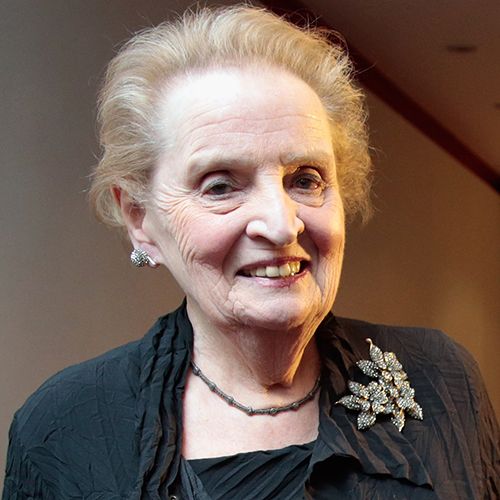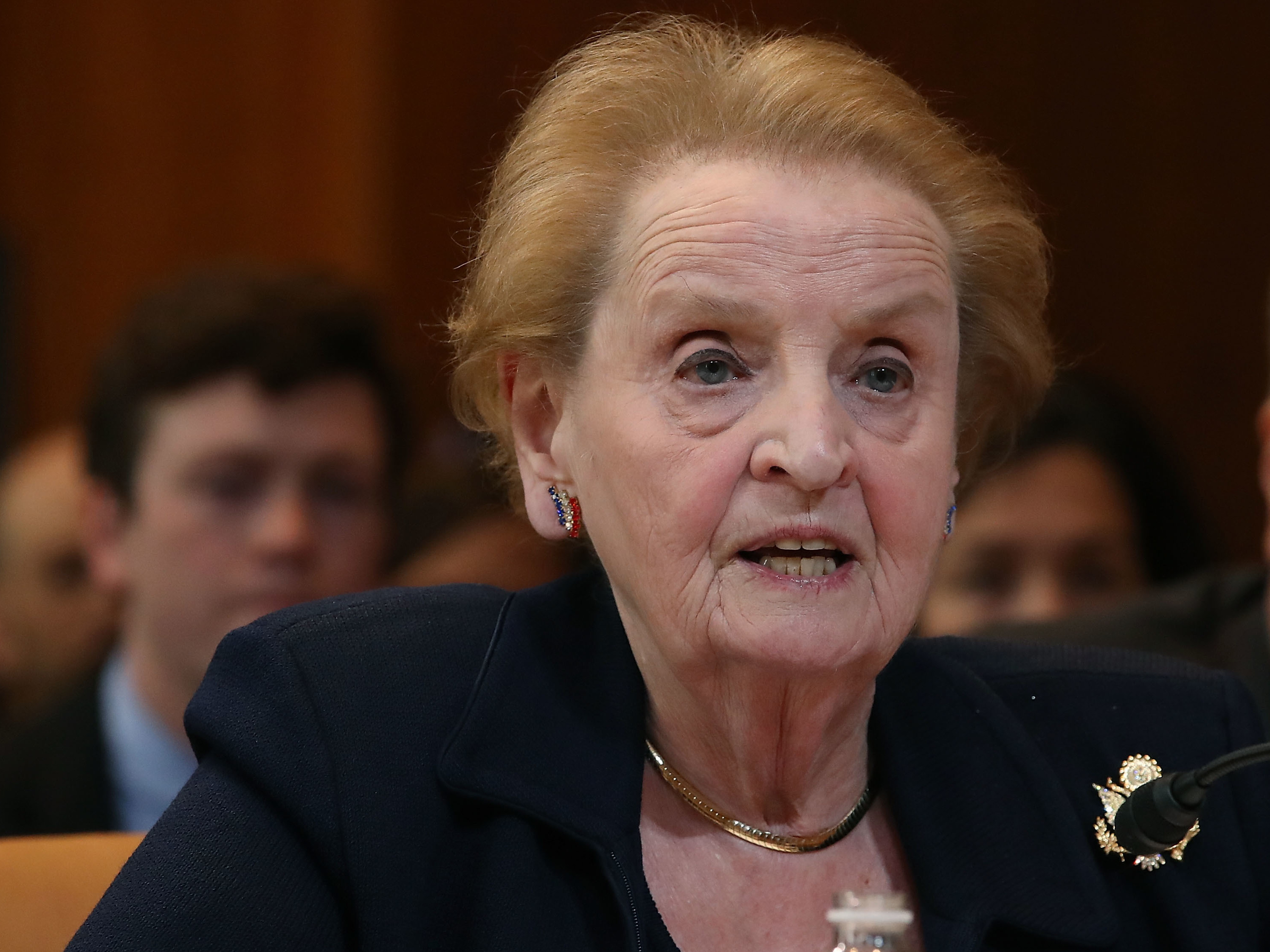Madeleine Albright: A Trailblazer in Diplomacy and Leadership
Introduction:
Madeleine Albright, a prominent figure in American politics, stands as a trailblazer in the field of diplomacy and leadership. As the first woman to serve as the United States Secretary of State, Albright shattered glass ceilings and left an indelible mark on the international stage. Throughout her illustrious career, she navigated complex geopolitical challenges, advocated for human rights, and championed American interests with grace and determination. In this essay, we will explore the life, achievements, and lasting legacy of Madeleine Albright, highlighting her pivotal role in shaping American foreign policy and advancing the cause of global diplomacy.
Early Life and Education:
Madeleine Korbel was born on May 15, 1937, in Prague, Czechoslovakia, into a family with a rich tradition of diplomacy and public service. Her father, Josef Korbel, was a Czech diplomat who fled to the United States following the Communist coup in Czechoslovakia in 1948. This early exposure to international affairs and diplomacy had a profound influence on Albright and laid the groundwork for her future career in public service.
Albright immigrated to the United States with her family and settled in Denver, Colorado. She earned her undergraduate degree from Wellesley College and later pursued a master's degree and a Ph.D. in public law and government from Columbia University. Albright's academic background provided her with a deep understanding of international relations and prepared her for the challenges she would face in the years ahead.
Rise to Prominence:
Albright's rise to prominence in American politics began in the 1970s when she joined the staff of Senator Edmund Muskie, working on foreign policy issues. She later served in various capacities within the National Security Council and the State Department during the Carter and Reagan administrations, honing her diplomatic skills and earning a reputation as a skilled negotiator.
In 1993, Albright was appointed by President Bill Clinton as the U.S. Ambassador to the United Nations, becoming the highest-ranking woman in the history of the U.S. government at that time. As ambassador, Albright played a key role in shaping U.S. foreign policy and advocating for American interests on the world stage. Her tenure at the UN was marked by her outspoken advocacy for human rights and her efforts to address global crises, including conflicts in the Balkans and Africa.
Groundbreaking Tenure as Secretary of State:
In 1997, Albright made history once again when she was sworn in as the 64th Secretary of State, becoming the first woman to hold the position. As Secretary of State, Albright faced a daunting array of challenges, including the aftermath of the Cold War, the spread of terrorism, and ethnic conflicts around the world.
One of Albright's most significant accomplishments as Secretary of State was her role in brokering peace agreements in the Balkans, which helped bring an end to the bloody conflicts that ravaged the region in the 1990s. Her diplomatic efforts, including the Dayton Accords, laid the groundwork for stability and reconciliation in the Balkans and earned her widespread praise for her leadership and diplomacy.
Albright also played a central role in shaping U.S. policy toward China, Russia, and other emerging powers, advocating for engagement and dialogue to address common challenges such as nuclear proliferation and climate change. Additionally, she was a vocal advocate for the expansion of NATO and the promotion of democracy and human rights around the world.
Legacy and Continued Influence:
Madeleine Albright's tenure as Secretary of State left an enduring legacy that continues to shape American foreign policy to this day. Her commitment to diplomacy, multilateralism, and the promotion of democratic values set a standard for future generations of diplomats and policymakers. Moreover, her status as the first woman to serve as Secretary of State inspired countless women around the world to pursue careers in diplomacy and public service.
Since leaving office, Albright has remained active in public life, writing books, lecturing, and advocating for causes dear to her heart, including women's rights and democracy promotion. Despite the challenges facing the world today, Albright remains optimistic about the power of diplomacy to address global problems and build a more peaceful and prosperous world.
In conclusion, Madeleine Albright's contributions to American diplomacy and leadership are undeniable. From her early days as the daughter of a Czech diplomat to her groundbreaking tenure as Secretary of State, Albright has exemplified the values of integrity, courage, and dedication to public service. Her impact on American foreign policy and her trailblazing achievements as a woman in diplomacy will be remembered for generations to come, serving as an inspiration to all those who aspire to make a difference in the world.
As a diplomat, Madeleine Albright's approach was characterized by pragmatism, empathy, and a deep commitment to advancing American interests while also upholding the principles of democracy and human rights. Her tenure as Secretary of State coincided with a period of profound change in the global landscape, marked by the end of the Cold War, the rise of new threats such as terrorism, and the emergence of new opportunities for international cooperation. Albright's efforts to promote democracy and human rights were particularly noteworthy. She believed that American leadership was essential in advancing these values globally and worked tirelessly to promote democratic governance and respect for human rights in countries around the world. Whether advocating for free and fair elections in emerging democracies or speaking out against authoritarian regimes, Albright remained steadfast in her commitment to advancing democratic principles.
Albright's efforts to promote democracy and human rights were particularly noteworthy. She believed that American leadership was essential in advancing these values globally and worked tirelessly to promote democratic governance and respect for human rights in countries around the world. Whether advocating for free and fair elections in emerging democracies or speaking out against authoritarian regimes, Albright remained steadfast in her commitment to advancing democratic principles.
One of the most challenging issues Albright faced during her tenure as Secretary of State was the conflict in the Balkans. The ethnic violence and humanitarian crisis that unfolded in the region following the breakup of Yugoslavia presented a formidable diplomatic challenge. Albright played a central role in advocating for U.S. intervention to end the bloodshed and broker a peace agreement. Her efforts culminated in the Dayton Accords, which brought an end to the fighting and laid the groundwork for peace and reconciliation in the region.
Albright's diplomatic achievements extended beyond the Balkans. She played a key role in promoting stability and cooperation in East Asia, working to strengthen U.S. alliances with countries such as Japan and South Korea while also engaging with China to address common challenges such as North Korea's nuclear program. Albright's efforts to engage with China were particularly significant, laying the groundwork for the constructive engagement policy that would define U.S.-China relations in the years to come. Another area where Albright left a lasting impact was in the realm of nuclear non-proliferation. She was a staunch advocate for arms control and disarmament, working to reduce the threat posed by nuclear weapons and prevent their proliferation to rogue states and terrorist organizations. Albright played a central role in negotiating the Strategic Arms Reduction Treaty (START II) with Russia and worked to strengthen international safeguards against the spread of nuclear weapons technology.
Another area where Albright left a lasting impact was in the realm of nuclear non-proliferation. She was a staunch advocate for arms control and disarmament, working to reduce the threat posed by nuclear weapons and prevent their proliferation to rogue states and terrorist organizations. Albright played a central role in negotiating the Strategic Arms Reduction Treaty (START II) with Russia and worked to strengthen international safeguards against the spread of nuclear weapons technology.
In addition to her diplomatic achievements, Madeleine Albright's legacy is also shaped by her role as a trailblazer for women in diplomacy and public service. As the first woman to serve as Secretary of State, Albright broke through barriers and shattered glass ceilings, paving the way for future generations of women leaders. Throughout her career, she has been a tireless advocate for women's rights and gender equality, championing initiatives to empower women and girls around the world.
In conclusion, Madeleine Albright's tenure as Secretary of State represents a shining example of principled leadership and effective diplomacy. Her commitment to promoting democracy, human rights, and peace helped shape American foreign policy in the post-Cold War era and left an indelible mark on the international stage. Albright's legacy as a trailblazer for women in diplomacy and her enduring contributions to global peace and security will be remembered for generations to come.







































